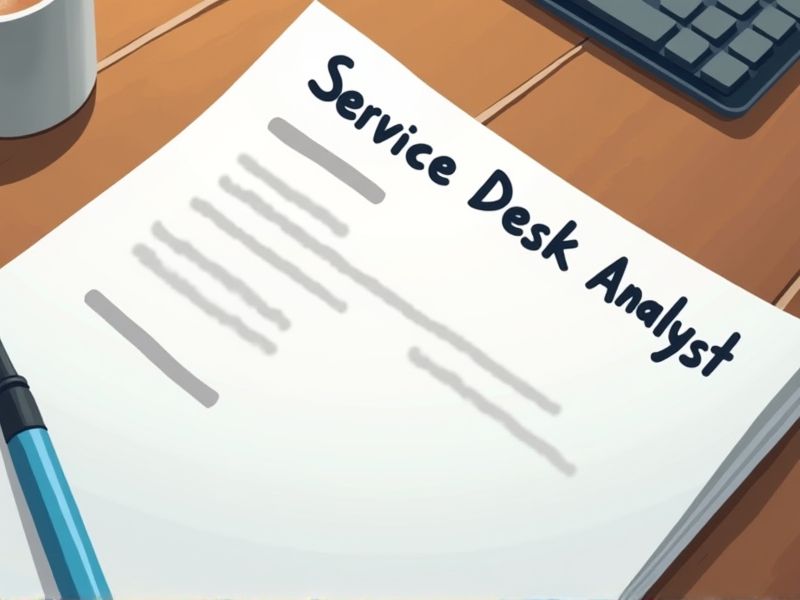
Service Desk Analysts play a pivotal role in managing IT service delivery, requiring a strong foundation in technical and customer service skills. Certifications ensure a standardized level of expertise, fostering greater efficiency in troubleshooting and resolving user issues. They provide credibility, often translating to increased trust and seamless communication between analysts and end-users. Key certifications to consider for a Service Desk Analyst include the following.
ITIL Foundation
ITIL Foundation provides Service Desk Analysts with a structured understanding of IT service management best practices, which enhances their ability to efficiently support IT services. Knowledge of ITIL processes, such as incident and problem management, enables Service Desk Analysts to effectively prioritize and resolve issues, improving service delivery. Understanding ITIL's service lifecycle fosters better communication and collaboration with other IT professionals, creating a more cohesive work environment. By following ITIL guidelines, Service Desk Analysts contribute to a more customer-focused approach, ultimately leading to higher customer satisfaction and loyalty.
CompTIA A+
The CompTIA A+ certification provides foundational knowledge crucial for troubleshooting a wide range of network and computer hardware issues, a core responsibility for Service Desk Analysts. By understanding key concepts such as operating systems, IT infrastructure, and software troubleshooting, professionals can efficiently resolve user issues and minimize downtime. Employers often recognize CompTIA A+ as a validation of technical expertise, improving job prospects and credibility for candidates. This certification also equips analysts with skills for implementing and maintaining computer systems, essential for supporting back-end operations and improving overall service delivery.
CompTIA Network+
Having a CompTIA Network+ certification equips a Service Desk Analyst with foundational knowledge of networking concepts, leading to more efficient troubleshooting of network issues. This credential ensures that the analyst understands network configurations and protocols, allowing for quicker diagnosis and resolution of user complaints. Organizations benefit from reduced downtime and improved customer satisfaction, as the analyst can handle a wider range of technical problems. The certification also provides the analyst with a competitive edge in career advancement, as it is a recognized benchmark for networking proficiency.
HDI Customer Service Representative (HDI-CSR)
The HDI Customer Service Representative (HDI-CSR) certification equips Service Desk Analysts with skills to enhance customer interaction, driving improved satisfaction. Trained representatives can effectively resolve issues, directly correlating to increased efficiency and reduced resolution times. Understanding customer service principles through HDI-CSR empowers analysts to manage diverse customer interactions, minimizing conflicts. By integrating HDI-CSR training, organizations often witness a significant boost in service quality, fostering trust and loyalty.
Microsoft Certified: Modern Desktop Administrator Associate
Obtaining the Microsoft Certified: Modern Desktop Administrator Associate certification equips Service Desk Analysts with the necessary skills to deploy, manage, and troubleshoot devices and client applications in enterprise environments. The certification ensures proficiency in Windows 10 and Microsoft 365, critical for providing efficient desktop support. Analysts gain a deeper understanding of mobile device management and security, which enhances their ability to protect organizational data. Certification also signals a commitment to professional development, increasing credibility and potentially boosting career prospects.
Cisco Certified Network Associate (CCNA)
The CCNA certification equips Service Desk Analysts with foundational networking knowledge, enhancing their ability to diagnose network-related issues efficiently. It provides an understanding of network protocols, which is crucial in troubleshooting and escalating technical problems accurately. Employers often value the CCNA as it indicates a standardized level of competency in networking, thus increasing a candidate's job marketability. The certification helps bridge communication between different IT teams, facilitating smoother collaboration and resolution processes.
CompTIA Security+
CompTIA Security+ certification demonstrates a strong understanding of fundamental security protocols, essential for safeguarding sensitive information on a service desk. Service Desk Analysts equipped with this certification can effectively identify and respond to security incidents, reducing potential threats to an organization's IT infrastructure. The certification also enhances an analyst's ability to implement security best practices, ensuring smoother daily operations and compliance with IT security regulations. Having Security+ credentials can improve credibility and trust in interactions with both technical teams and end users.
HDI Support Center Analyst (HDI-SCA)
The presence of an HDI Support Center Analyst is crucial because it provides structured methodologies that enhance the efficiency of service desk operations. By employing best practices and industry standards, an HDI-SCA ensures consistent problem resolution and customer satisfaction. Expertise from such analysts leads to improved incident management and reduced resolution times. Their training can optimize resource allocation, minimizing service disruptions and increasing overall productivity.
Google IT Support Professional Certificate
The Google IT Support Professional Certificate provides foundational knowledge that aligns with the technical skills required for a Service Desk Analyst role. It enhances problem-solving capabilities by teaching troubleshooting practices and networking essentials. The certificate covers customer service skills, which are crucial for efficient communication and user assistance. Employers recognize this credential as a standardized measure of proficiency, making candidates more competitive in the job market.
ServiceNow Certified System Administrator
Having a ServiceNow Certified System Administrator in a Service Desk Analyst role leads to more efficient incident management and problem resolution due to an in-depth understanding of the platform. The certification equips analysts with the skills to customize workflows and automate repetitive tasks, reducing response times and increasing productivity. Knowledge from the certification ensures proper configuration and maintenance of the system, thereby enhancing overall service quality. Accurate reporting and data insights facilitated by certified administrators aid in informed decision-making and process improvements.
Summary
When you earn certifications as a Service Desk Analyst, your expertise and technical proficiency are significantly enhanced. This qualification can lead to increased confidence from clients and colleagues, improving trust and workplace dynamics. Your ability to resolve complex issues efficiently might result in quicker service delivery and reduced downtime for users. You can also anticipate better career opportunities and potential salary increases, fostering professional growth.
